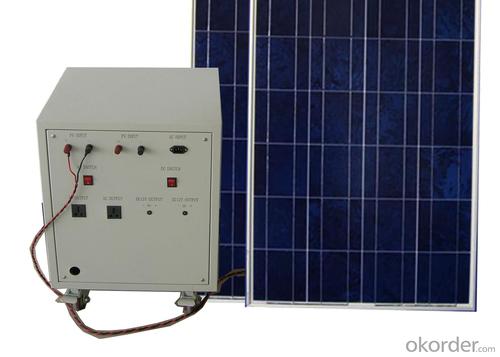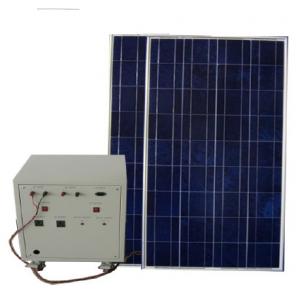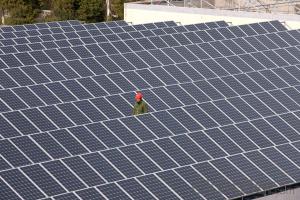Solar Energy Systems Penrith - CNBM Solar Home System CNBM-K3 (200W)
- Loading Port:
- China Main Port
- Payment Terms:
- TT or L/C
- Min Order Qty:
- 1 set set
- Supply Capability:
- 1000 sets per month set/month
OKorder Service Pledge
OKorder Financial Service
You Might Also Like
Brief Introduction of Solar Energy System CNBM-K3 (200W)
CNBM International is highly recognized by its business partners and clients all over the world and has obtained rapid development under the spirit of win-win .With CNBM HomeSystem-K3(200W),
We will carry on the mutual beneficial,innovative and revolutionary trading structure as we did before,
create value for our employees,share holders and clients and benefit the whole society in our future development.Please contact us ,if
you have interest in CNBM Home System-K3 (200W),don’t hesitate!
The Sketching of Solar Energy System CNBM-K3 (200W)
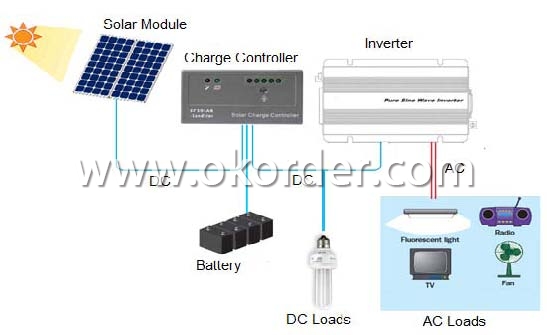
Components of Solar Energy System CNBM-K3 (200W)
PV Array:
Convert sunlight instantly into DC electric power. Formed by the solar modules (also called photovoltaic modules) in accordance with the system requirements for series and parallel.
Solar Charge Controller:
A charge controller may be used to power DC equipment with solar panels. The charge controller provides a regulated DC output and stores excess energy in a battery as well as monitoring the battery voltage to prevent over charge or over discharge. An inverter can be connected to the output of a charge controller to drive AC loads.
Inverter:
Converts DC output power of photovaltaic soalr panels into standard AC power for use in the local off-grid electrical network. It is a critical component in a photovoltaic system, allowing the use of ordinary commercial appliances.
Battery banks:
Stores energy when there is an excess coming in and distribute it back out when there is a demand. Solar PV panels continue to re-charge batteries each day to maintain battery charge.
Technical data of Solar Home System CNBM-K3 (200W) | ||
Inverter | Rated load power | 500W |
Output wave | Pure sine wave | |
Output voltage | DC 24V | |
Output frequency | DC:12V AC:220V | |
Precision of output | 50HZ/60HZ | |
Precision of output frequency | ±6% | |
Solar panel | Pmax | 100W*2PCS |
Vmp | 18.4V*2 | |
Imp | 5.44A | |
Charger | Charger voltage & current | 24V 10A |
Battery | Capacity | 12V 50AH*2 |
Power box | Spray paint iron box,with input,output,ammeter,voltmeter,master swith and so on. | |
Package of Solar Home System CNBM-K3 (200W) | ||||
Part | Size(L*W*H mm) | Weight(kg) | 20’(pcs) | 40’(pcs) |
Power box | 580*520*540 | 60 | 96 Sets | 240 Sets |
Solar panel | 1120*670*30 | 17 | ||
Battery | 230*310*220 | 40 | ||
Factory Picture of Solar Energy System CNBM-K3 (200W)
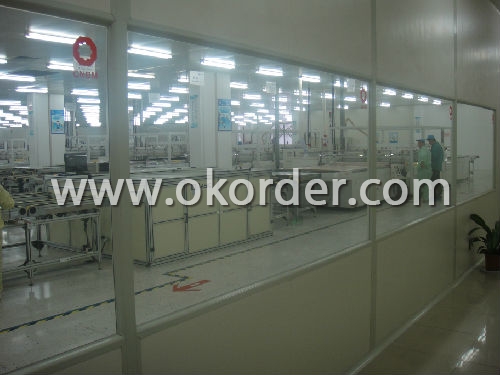
Package Picture of Solar Energy System CNBM-K3 (200W)
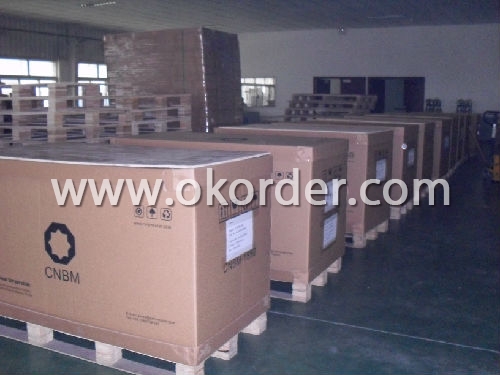
- Q: Can solar energy systems be used for heating and cooling?
- Yes, solar energy systems can be used for heating and cooling. Solar thermal systems can capture and harness the sun's heat to provide hot water or space heating, while solar-powered air conditioning systems use solar energy to cool indoor spaces.
- Q: How do solar energy systems impact roof maintenance and repairs?
- Solar energy systems can have both positive and negative impacts on roof maintenance and repairs. On one hand, the installation of solar panels can provide an additional layer of protection to the roof, shielding it from the elements and prolonging its lifespan. However, roof maintenance becomes more challenging as solar panels need to be temporarily removed or adjusted during inspections or repairs. Additionally, the installation process itself may cause minor damage to the roof, which should be promptly addressed to prevent any long-term issues. Overall, proper planning, regular inspections, and timely repairs are crucial to ensure the optimal performance of both the solar energy system and the roof.
- Q: Can solar energy systems be used for powering RVs or campers?
- Yes, solar energy systems can be used to power RVs or campers. Solar panels can be mounted on the roof of the vehicle or portable panels can be set up nearby to capture sunlight and convert it into electricity. This renewable energy source can charge the batteries of the RV or camper, providing power for lights, appliances, and other electrical needs while on the road or camping.
- Q: Are there any tax credits available for installing a solar energy system?
- Yes, there are tax credits available for installing a solar energy system. The federal government offers a Solar Investment Tax Credit (ITC) that allows homeowners and businesses to deduct a percentage of the system's cost from their taxes. Additionally, some states and local governments may also offer their own tax incentives for solar installations.
- Q: How do solar energy systems impact energy resilience during natural disasters?
- Solar energy systems can significantly enhance energy resilience during natural disasters. These systems provide a reliable and independent source of electricity, enabling critical infrastructure and essential services to continue functioning even when the main power grid is disrupted. Solar panels can continue generating electricity as long as there is sunlight available, reducing the reliance on fuel-dependent generators and minimizing the risk of fuel shortages during emergencies. Additionally, solar energy systems can be paired with battery storage, allowing excess energy to be stored and used during nighttime or cloudy periods. This combination ensures a continuous power supply, enabling emergency response efforts, communication networks, and healthcare facilities to operate, thereby enhancing overall energy resilience during natural disasters.
- Q: Are there any safety concerns associated with solar energy systems?
- Yes, there are some safety concerns associated with solar energy systems. The main concerns include the risk of electric shock during installation or maintenance, fire hazards due to faulty wiring or equipment, and potential exposure to hazardous materials during manufacturing or disposal. However, with proper installation, maintenance, and adherence to safety standards, these risks can be effectively mitigated, making solar energy systems a safe and reliable source of renewable energy.
- Q: How do solar energy systems impact the reduction of nuclear power reliance?
- Solar energy systems can have a significant impact on reducing reliance on nuclear power by providing a clean and renewable alternative. As solar power becomes more accessible and affordable, it can help decrease the need for nuclear power plants, which often pose environmental and safety concerns. Additionally, solar energy systems can decentralize power generation, allowing individuals and communities to generate their own electricity and reduce their dependence on centralized nuclear facilities.
- Q: Can solar energy systems be used in colder climates?
- Yes, solar energy systems can be used in colder climates. While solar panels do work more efficiently in warmer temperatures, they can still generate electricity in colder regions. Additionally, advancements in technology have improved the performance of solar panels in colder climates, allowing them to capture and convert sunlight into usable energy even in snowy or cloudy conditions.
- Q: Can a solar energy system be installed on a data center or tech facility?
- Yes, a solar energy system can be installed on a data center or tech facility. In fact, many data centers and tech facilities are now embracing renewable energy sources like solar power to reduce their carbon footprint and lower their energy costs. A solar energy system can be installed on the roof or surrounding areas of the facility, utilizing the available space to generate clean and sustainable electricity. This not only helps the facility to become more environmentally friendly but also provides a reliable and independent source of power. Additionally, with advancements in solar technology, it is now possible to design and install solar systems that can cater to the high energy demands of data centers and tech facilities. By harnessing the power of the sun, these facilities can operate more sustainably and contribute to a greener future.
- Q: Can solar energy systems be used for powering hospitals?
- Yes, solar energy systems can be used for powering hospitals. Solar power can provide a reliable and sustainable energy source for hospitals, helping to reduce their dependence on the grid and lower their energy costs. Solar panels can be installed on hospital rooftops or in nearby areas to generate electricity that can be used to power various hospital operations and equipment. Additionally, solar energy systems can provide backup power during emergencies or grid failures, ensuring continuous operation of critical medical equipment.
Send your message to us
Solar Energy Systems Penrith - CNBM Solar Home System CNBM-K3 (200W)
- Loading Port:
- China Main Port
- Payment Terms:
- TT or L/C
- Min Order Qty:
- 1 set set
- Supply Capability:
- 1000 sets per month set/month
OKorder Service Pledge
OKorder Financial Service
Similar products
Hot products
Hot Searches
Related keywords



